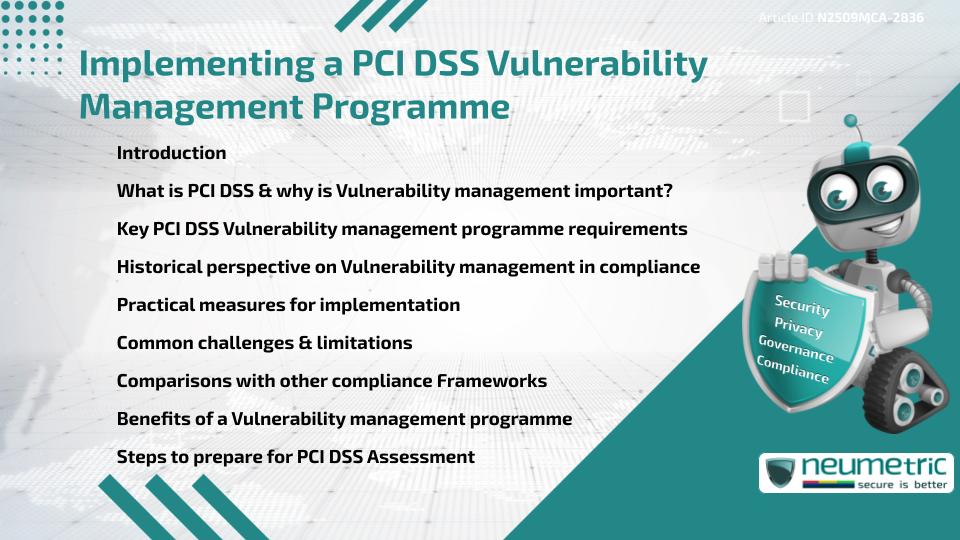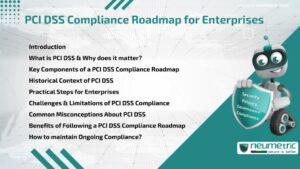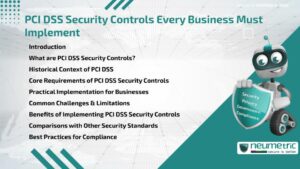Table of Contents
ToggleIntroduction
PCI DSS Vulnerability management programme requirements are central to achieving & maintaining compliance with the Payment Card Industry Data Security Standard [PCI DSS]. A well-structured programme ensures that Vulnerabilities in systems, applications & networks are identified, assessed & remediated promptly. This article explores the requirements, Best Practices, challenges & benefits of implementing an effective Vulnerability management programme for PCI DSS Compliance.
What is PCI DSS & why is Vulnerability management important?
PCI DSS is a global Standard aimed at protecting Cardholder Data & reducing fraud Risks. Vulnerability management is important because attackers often exploit unpatched systems & weak configurations. A PCI DSS Vulnerability management programme ensures that Organisations regularly scan, patch & monitor their systems, thereby reducing Risks of breaches & maintaining trust with Customers & Stakeholders.
Key PCI DSS Vulnerability management programme requirements
The PCI DSS outlines specific requirements for Vulnerability management, including:
- Performing internal & external Vulnerability scans at least quarterly.
- Conducting scans after any significant change in the network.
- Remediating high-Risk Vulnerabilities promptly.
- Implementing a Patch Management process to ensure timely updates.
- Using intrusion detection & prevention systems to monitor Threats.
- Engaging Approved Scanning Vendors [ASVs] for external scans.
These requirements ensure that Vulnerabilities are systematically addressed.
Historical perspective on Vulnerability management in compliance
In the early 2000s, data breaches often occurred due to unpatched systems. PCI DSS introduced formal Vulnerability management requirements to address these gaps. Over time, scanning technologies & Patch Management processes have evolved, making compliance more structured & effective. Today, Vulnerability management is recognized as a fundamental part of cyber defense strategies.
Practical measures for implementation
Organisations can implement an effective PCI DSS Vulnerability management programme by:
- Establishing a Vulnerability management policy aligned with PCI DSS.
- Scheduling regular internal & external scans.
- Prioritizing remediation based on Risk severity.
- Automating patch deployment where possible.
- Documenting remediation activities for Audit purposes.
- Training staff on Vulnerability awareness & responsibilities.
Consistent execution & documentation are essential for compliance.
Common challenges & limitations
While critical, Vulnerability management poses several challenges:
- Resource constraints for Continuous Monitoring & patching.
- Complexity in large or hybrid IT environments.
- False positives from scanning tools requiring manual verification.
- Resistance to downtime for patch application.
Overcoming these challenges requires strong coordination between IT, security & business teams.
Comparisons with other compliance Frameworks
Other Frameworks like ISO 27001 & NIST also emphasise Vulnerability management. However, PCI DSS is more prescriptive, requiring quarterly scans & use of ASVs. Unlike general security Standards, PCI DSS ties Vulnerability management directly to the protection of Cardholder Data, making it more specific in scope.
Benefits of a Vulnerability management programme
A robust PCI DSS Vulnerability management programme provides several benefits:
- Reduced Risk of breaches & data theft.
- Stronger compliance posture & Audit readiness.
- Improved operational resilience through proactive patching.
- Enhanced trust from Customers, partners & regulators.
These benefits demonstrate the value of consistent Vulnerability management efforts.
Steps to prepare for PCI DSS Assessment
To prepare for Assessment, Organisations should:
- Map current Vulnerability management practices against PCI DSS requirements.
- Identify & remediate gaps in scanning & patching.
- Maintain records of scans, reports & remediation activities.
- Train staff & raise awareness about compliance responsibilities.
- Engage Qualified Security Assessors [QSAs] to validate readiness.
These steps ensure smoother assessments & long-term compliance success.
Takeaways
- A PCI DSS Vulnerability management programme identifies, assesses & remediates system weaknesses.
- Key requirements include quarterly scans, Patch Management & external validation.
- Challenges include complexity, resource needs & downtime for patching.
- Benefits include reduced breaches, compliance readiness & stronger trust.
- Documentation & consistent execution are essential for certification.
FAQ
What is a PCI DSS Vulnerability management programme?
It is a structured process for identifying, scanning & remediating Vulnerabilities to protect Cardholder Data.
Why is Vulnerability management important in PCI DSS?
Because attackers exploit unpatched systems & Vulnerability management reduces these Risks.
How often must Vulnerability scans be conducted?
At least quarterly & after any significant network changes.
Who conducts external Vulnerability scans?
Approved Scanning Vendors [ASVs] authorized by the PCI Security Standards Council.
What challenges exist in Vulnerability management?
Challenges include resource limitations, false positives & downtime required for patching.
How does Vulnerability management benefit businesses?
It reduces the Likelihood of breaches, strengthens compliance & increases Customer Trust.
Does PCI DSS require Patch Management?
Yes, Organisations must apply patches in a timely manner to remediate Vulnerabilities.
Need help for Security, Privacy, Governance & VAPT?
Neumetric provides organisations the necessary help to achieve their Cybersecurity, Compliance, Governance, Privacy, Certifications & Pentesting needs.
Organisations & Businesses, specifically those which provide SaaS & AI Solutions in the Fintech, BFSI & other regulated sectors, usually need a Cybersecurity Partner for meeting & maintaining the ongoing Security & Privacy needs & requirements of their Enterprise Clients & Privacy conscious Customers.
SOC 2, ISO 27001, ISO 42001, NIST, HIPAA, HECVAT, EU GDPR are some of the Frameworks that are served by Fusion – a SaaS, multimodular, multitenant, centralised, automated, Cybersecurity & Compliance Management system.
Neumetric also provides Expert Services for technical security which covers VAPT for Web Applications, APIs, iOS & Android Mobile Apps, Security Testing for AWS & other Cloud Environments & Cloud Infrastructure & other similar scopes.
Reach out to us by Email or filling out the Contact Form…





